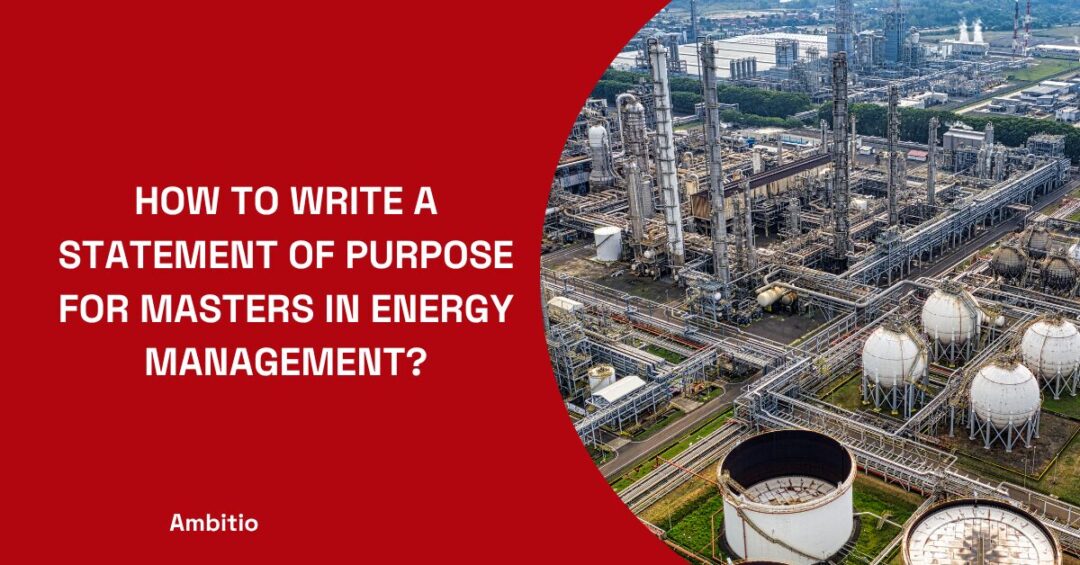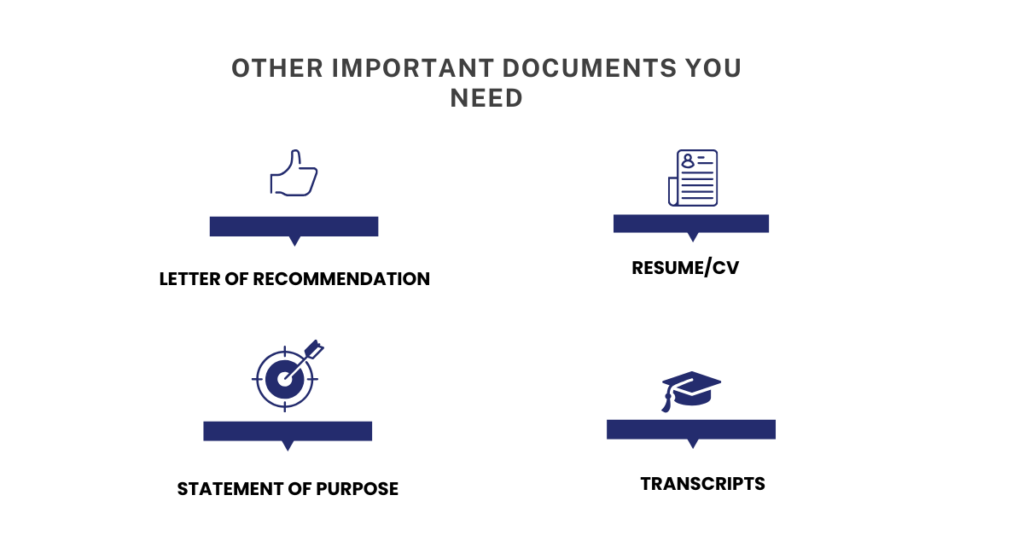13 May 2025
6 minutes read
How To Write A Statement Of Purpose For Masters In Energy Management As An Indian Student?

Key Takeaways
- A well-crafted statement of purpose for masters in energy management is essential to stand out in competitive programs.
- Align your academic background and career goals with the specific energy management program to make a lasting impression.
- Understanding global energy trends like the rise of renewable energy can strengthen your SOP and demonstrate industry awareness.
While writing this article, we did a lot of research and found that in 2023, the global energy sector is undergoing one of its most transformative shifts, with renewable energy sources now accounting for 29% of total electricity generation worldwide. But here’s the catch: no matter how impressive your qualifications, standing out in energy management programs requires more than just grades.
You need a Statement of Purpose (SOP) that speaks to your passion for sustainable energy and understanding of energy policies. And here’s where most applicants fall short—generic statements that don’t show the real “why.” The solution? Craft an SOP that demonstrates your clear vision for the future of energy management, backed by your unique perspective and experience.
How To Structure A Statement Of Purpose (SOP)?
Take this rule: when you start writing your SOP for energy management, forget about generic phrases like “I’ve always had a passion for energy.” The admissions committee isn’t here for that cookie-cutter nonsense. They want to know exactly how you’re going to tackle energy crises, improve energy efficiency, and make a real impact in the energy industry.
So, don’t just talk about your desire to “help save the planet.” Be specific. Show your grasp of the energy systems that will shape the future, whether it’s renewable energy systems or energy conservation.

Here’s how to structure your Statement of Purpose (SOP) in a way that makes admissions officers take notice:
1. Start with Your Passion, But Ground It in Reality
It’s tempting to dive into why you’re “obsessed” with renewable energy or why you want to save the planet. But instead, focus on your true drive: Why are you pursuing an MS in Renewable Energy? Talk about the necessity for energy conservation and independence in energy-starved industries, and how your background sets you up to contribute to the advancement of energy systems.
2. Clearly Connect Your Past to Your Future
Don’t just say you’re interested in energy and environmental management. Explain how your undergraduate studies in electrical engineering or previous work on energy projects led to your decision to pursue a master’s degree. A strong SOP for MS or MSc programs should show how your past experience prepares you for the energy management program. Did you work on a project to store solar energy or design energy-efficient systems? Show it.
3. Showcase Your Understanding of the Industry
Crafting SOPs for energy engineering or energy management engineering isn’t about showing you can regurgitate textbook knowledge. It’s about demonstrating you understand the real challenges in the energy industry today—like how renewable energy sources can be integrated into existing energy resources or how net metering could change the game. The energy industry is evolving rapidly; show that you’re ready for it.
4. Align Your Goals with the Program
Your SOP should align with the specific goals of the energy management program you’re applying to. Tailor your SOP for energy management to show how you plan to solve real-world problems like energy crises or energy efficiency issues. If you’re applying to a program that focuses on renewable energy systems, explain how you want to lead energy projects that contribute to a more cost-effective and sustainable energy future.
5. Highlight Your Unique Qualities
Don’t just list your achievements—demonstrate how they make you a perfect fit for the program. Universities worldwide are looking for students with a clear vision, a solid understanding of energy systems, and a track record of industrial research or real-world application. Show how your unique qualities will contribute to the program and, ultimately, your career aspirations in the energy management field.
What To Write In SOP For Energy Management To Make It Great?
A generic Statement of Purpose (SOP) will never cut it. If you’re applying for a degree in energy management, admissions committees aren’t interested in vague claims about your “passion for energy.” They want to see how you plan to solve real-world challenges in the energy sector.

The necessity for SOP for energy management programs is critical—it’s your opportunity to stand out and show that you’re not just another applicant. With the right focus, your SOP can become the deciding factor that gets you into your desired program, whether it’s a Master’s degree abroad or an energy management engineering specialization.
1. Understand the Necessity for a Strong SOP
Your Statement of Purpose is more than just a formality—it’s an essential document that can determine your acceptance. The necessity for SOP for energy management programs can’t be overstated. Admissions committees use it to gauge your passion, academic readiness, and future goals. Without a compelling SOP, even the best grades may not be enough to set you apart.
2. Ensure Your SOP Aligns with Your Career Aspirations
Your SOP for energy management engineering should demonstrate a clear link between your past experiences and your future goals. The SOP that aligns with the program’s focus will show that you have a solid understanding of the field and how pursuing a degree abroad can help you reach your professional objectives. Be specific about how the program’s unique offerings will help you solve energy challenges.
3. Showcase Your Study and Research Experience
A strong SOP should highlight your ability to contribute to both academic and practical research. If you’ve worked on energy projects or have experience with energy systems, mention it. Study and research in energy management or renewable energy will show the admissions committee that you’re ready to dive deeper into the subject matter during your Master’s degree abroad.
4. Share Personal Insights and Specific Experiences
Admissions teams want to know more than just your qualifications—they want to see what makes you unique. Share specific examples that explain your drive to pursue energy management. Whether it’s a project you worked on, a challenge you faced in energy conservation, or a significant personal experience, these details will help your SOP stand out and show your commitment to the field.
5. Clarify Your Vision for the Future
Your SOP should clearly outline your long-term goals in the energy industry. Whether you aim to work on energy efficiency or renewable energy systems, explain how the program will help you make a meaningful impact. A well-crafted SOP for energy management shows that you have a clear vision for your future and that you’re committed to contributing to the energy sector’s growth.
10 Top University To Study Masters In Energy Management Program
Once a mentor taught me, you don’t just need any degree; you need the right degree from the right place. He was and is right. Because, let’s be honest, when you’re talking about managing global energy systems, renewable energy, and cutting-edge technology, you’re not just playing with numbers—you’re playing with the future of the planet.
So, let’s cut to the chase: here are the top 10 universities to study your Master’s in Energy Management, where your education will be as powerful as the renewable energy systems you’ll help design.
| University Name | Average Tuition Fees | Average Salary After Graduation | Other Documents Required |
|---|---|---|---|
| Stanford University (USA) | $55,000/year | $95,000/year | Resume, Letters of Recommendation, GRE Scores, SOP |
| University of California, Berkeley (USA) | $45,000/year | $85,000/year | Transcripts, CV, SOP, Letters of Recommendation |
| Imperial College London (UK) | £38,000/year | £60,000/year | Academic Transcripts, Recommendation Letters, SOP |
| ETH Zurich (Switzerland) | CHF 1,500/year | CHF 95,000/year | Bachelor’s Degree, Letters of Reference, CV |
| University of Cambridge (UK) | £34,000/year | £70,000/year | SOP, Academic Transcripts, Recommendation Letters |
| Delft University of Technology (Netherlands) | €18,000/year | €55,000/year | SOP, CV, Letters of Recommendation, Transcript |
| National University of Singapore (Singapore) | $40,000/year | $80,000/year | Academic Transcripts, SOP, Letters of Recommendation |
| University of Melbourne (Australia) | AUD 45,000/year | AUD 75,000/year | SOP, Resume, Transcripts, Recommendation Letters |
| Technical University of Munich (Germany) | €14,000/year | €60,000/year | SOP, Transcripts, Recommendation Letters |
| Politecnico di Milano (Italy) | €12,000/year | €50,000/year | CV, Academic Transcripts, Letters of Recommendation |
Conclusion
A well-crafted SOP is a mandatory requirement, and when done right, it speaks to both your commitment and your potential in solving global energy challenges. Whether you’re focusing on renewable energy or energy systems, it’s important to align your experience and vision with the program you’re applying to.
Just like the shift away from diesel in energy production, your approach to this degree should be focused on sustainable progress. Don’t just settle for any program—pick the one that will help you drive change and make a real impact in the industry. Your future in energy management starts with the right foundation. Make it count.
Most applicants struggle to write a perfect statement of purpose but end up sounding arrogant — but you won’t. At Ambitio, our AI-powered study abroad experts help you craft a powerful, standout statement of purpose that gets noticed. No fluff, no clichés—just a compelling story that proves you belong. Schedule a call with Ambitio’s experts.
FAQs
What is a Statement of Purpose (SOP) for a Master’s in Energy Management?
A Statement of Purpose is a personal essay required by universities where you explain your academic background, career goals, motivation for pursuing the program, and why you are a good fit for the course and institution
Why is the SOP important for Energy Management programs?
The SOP is a critical part of your application, helping admissions committees assess your suitability, motivation, and how your goals align with the program’s objectives, especially given the evolving energy sector
What should I include in my SOP for Energy Management?
Include your academic history, relevant work or project experience, research interests, reasons for choosing the program, and your career aspirations in the energy sector
How long should my SOP be?
Most SOPs are between 500 and 1,000 words, but you should always check the specific requirements of each university
How should I structure my SOP?
A typical SOP has an introduction (introducing yourself and your goals), a main body (detailing your academic and professional background, interests, and motivations), and a conclusion (summarizing your aspirations and fit for the program)
What makes an SOP for Energy Management stand out?
A strong SOP highlights unique qualities, demonstrates a clear understanding of energy sector challenges, and shows how your admission would benefit both you and the university

You can study at top universities worldwide!
Get expert tips and tricks to get into top universities with a free expert session.
Book Your Free 30-Minute Session Now! Book a call now




























